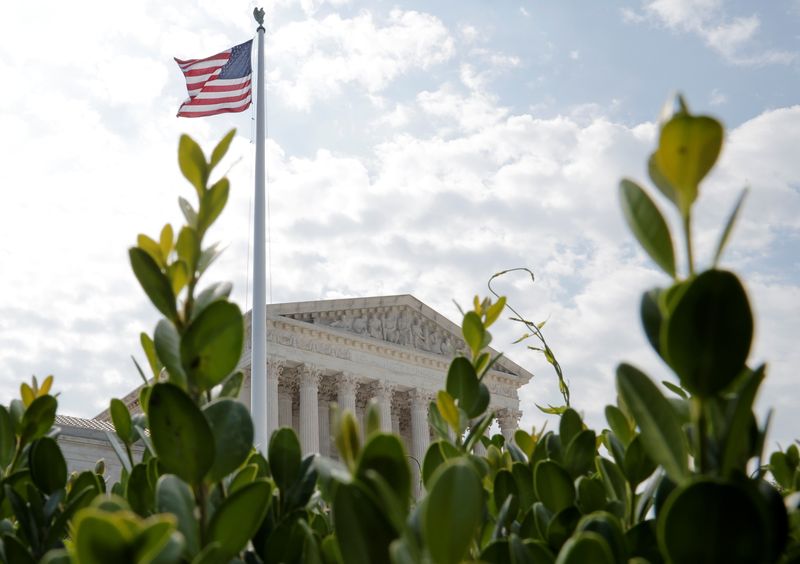By Brendan Pierson
(Reuters) - Though the temporary local, state and federal policies put in place to fight the COVID-19 pandemic may be expiring, they have left an indelible mark on the legal landscape, particularly in the area of religious liberty, legal experts say.
Since the addition of Justice Amy Coney Barrett shifted the Supreme Court's ideological balance to the right, many court watchers expect its approach to religious freedom to change accordingly.
Litigation over COVID, however, has proved to be an accelerant, thanks to the court's so-called shadow docket https://www.reuters.com/article/legal-us-usa-court-shadow-video-idUSKBN2BF16Q, giving it multiple occasions to decide religious freedom issues on emergency motions and provide little reasoning.
Those orders have overturned a range of restrictions on religious gatherings in multiple states – particularly in California, which has had the nation's toughest COVID measures – on the grounds that some secular venues, such as airports, are less restricted.
In the most recent COVID-19 related decision, Tandon v. Newsom, an unsigned 5-4 ruling https://www.supremecourt.gov/opinions/20pdf/20a151_4g15.pdf in April that struck down restrictions on group religious activities in private homes, the unsigned majority opinion said that rules require strict scrutiny "whenever they treat any comparable secular activity more favorably than religious exercise."
The upshot of those decisions, experts said, has been a "most-favored nation" rule for religion: the principle that, if any activity is granted an exception under the law for any reason, that exception must also be extended to religion.
"It's very likely that this court would have headed there anyway," said Jim Oleske, a law professor at Lewis and Clark University. "What's unclear is whether they would have taken precisely the doctrinal path they now have taken."
"The law governing free exercise claims has radically shifted as a result of its confrontation with state laws that restrict activities," said Nicholas Bagley, a professor at the University of Michigan Law School who served as special counsel to Michigan Governor Gretchen Whitmer in litigation over COVID restrictions.
Before COVID, Bagley said, "it wouldn't be enough to say, well, the law doesn't speak about religion, but it has an effect on my religious practices that's really bad."
That was largely thanks to the Supreme Court's 1990 decision in Employment Division v. Smith https://tmsnrt.rs/3w6Zkg8, which upheld Oregon's ban on the hallucinogenic drug peyote, even in Native American religious ritual. It said that the state's general ban on the drug did not violate the Constitution's free exercise clause because it did not specifically target religion.
In a closely watched pending case, Fulton v. City of Philadelphia, a Catholic adoption agency is urging https://tmsnrt.rs/3x2Rfch the Supreme Court to overturn Smith. The agency is challenging a city ordinance halting the placement of foster children with adoption agencies that do not facilitate adoption by same-sex couples.
Religious plaintiffs have also worked in the past to chip away at Smith by arguing that an apparently neutral law could be unconstitutional if it was motivated by "animus" against religion, according to Elizabeth Sepper, a professor at the University of Texas at Austin School of Law.
One notable success for this approach was in the Supreme Court's 2017 ruling in Masterpiece Cakeshop v. Colorado Civil Rights Commission https://www.supremecourt.gov/opinions/17pdf/16-111_j4el.pdf, in which then-Justice Anthony Kennedy found that the Colorado Civil Rights Commission was motivated by "hostility" to a baker's religious views when it ordered him to make a cake for a same-sex wedding, and reversed the commission's decision.
But the most-favored nation rule implied by the court's emergency orders has shown a way to sidestep Smith altogether, she said.
"The court, in (a) series of very short emergency orders often without any reasoning, appears to have reversed its prior position on free exercise," Sepper said.
The scope of the doctrine may become clearer when the court issues its opinion in the gay adoption case, but some religious liberty advocates are already claiming victory.
"What the Supreme Court has communicated most clearly is as long as there is any sort of relevant comparable activity that the state allows to happen, it has to allow religious activity to happen on the same terms," said Robert Dunn of Eimer Stahl, who has represented plaintiffs challenging restrictions in California. Read more: U.S. Supreme Court backs religious groups over New York virus curbs https://www.reuters.com/article/health-coronavirus-usa-court/u-s-supreme-court-backs-religious-groups-over-new-york-virus-curbs-idINKBN2860CG
